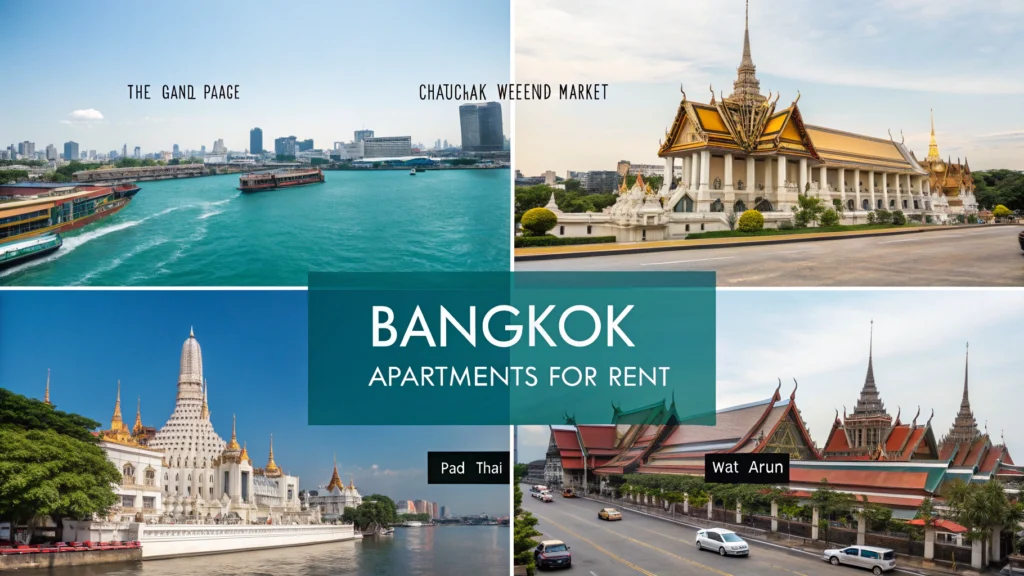My Bangkok Apartment Hunt Adventure
Finding bangkok apartments for rent nearly broke me last year. No joke. After three visits to Thailand as a tourist staying in hotels, I decided to take the plunge and move to Bangkok for six months to finish writing my travel book (and eat my body weight in mango sticky rice). I thought apartment hunting would be straightforward—I mean, how hard could it be in a city with literally thousands of rental options?
Turns out, pretty damn hard when you don’t know what you’re doing.
I spent my first week in a sweaty panic, bouncing between overpriced tourist traps and sketchy units with mysterious stains on the ceiling. By day three, I nearly booked a flight home. Instead, I took a deep breath, did some proper research, and eventually found my perfect Bangkok home—a surprisingly affordable one-bedroom in Ekkamai with a balcony just big enough for morning yoga and evening Chang beers.
Now I’m passing on everything I learned the hard way, so you don’t have to make my rookie mistakes. Whether you’re looking for a luxury pad in Sukhumvit, a budget-friendly studio near a university, or just trying to figure out what the heck a “serviced apartment” actually includes, I’ve got you covered. Let’s dive into the world of Bangkok apartment rentals—the good, the bad, and the occasionally leaky air conditioner.
Understanding Bangkok’s Rental Market
Before we get into specific neighborhoods and tips, it’s worth understanding the overall rental landscape in Bangkok. The city is MASSIVE—sprawling in all directions with distinct areas that feel like entirely different cities.
Bangkok’s apartment rental market is surprisingly diverse and, in many ways, more sophisticated than what you’ll find in many Western cities. From ultra-luxury penthouses to simple studios, there’s something for every budget. And here’s the best part—your money goes WAY further here.
Types of Rental Properties
In Thailand’s capital, your living options fall into several categories, each with different pros and cons:
Condominiums (Condos): The most common choice for expats and digital nomads. These typically offer security, a pool, gym, and sometimes other amenities. Most are fairly modern, and many were built specifically with foreign renters in mind.
Apartments: Generally older than condos and may lack some amenities, but can be cheaper. They’re often managed directly by the owner rather than a juristic office.
Serviced Apartments: These come fully furnished with regular cleaning service, similar to hotels but designed for longer stays. Perfect if you don’t want to deal with setting up utilities or buying furniture.
House: While less common for short-term rentals, houses in Bangkok offer more space and privacy. You’ll find them more in outer districts rather than central areas.
Shophouses: These multi-story buildings typically have a business on the ground floor with living space above. They can offer a unique living experience but aren’t always properly converted for residential use.
I initially thought I wanted a traditional Thai house for the “authentic experience” but quickly changed my tune after seeing how isolated they can be from public transportation. For most visitors staying more than a month but less than a year, condos and serviced apartments tend to make the most sense.
Typical Costs and What to Expect
Let’s talk money. Rental prices in Bangkok vary WILDLY depending on location, property age, amenities, and furnishings. Here’s a rough breakdown:
| Area | Budget (฿10,000-20,000) | Mid-Range (฿20,000-40,000) | Luxury (฿40,000+) |
|---|---|---|---|
| Central Sukhumvit | Small studio, older building | 1BR in modern condo with facilities | 2BR+ luxury condo with high-end finishes |
| Sathorn/Silom | Compact studio, basic amenities | Comfortable 1BR with pool/gym | Spacious units with river views |
| Ari/Chatuchak | Spacious studio or 1BR | Modern 1-2BR with excellent facilities | Large units in premium developments |
| Outer Areas | Large 1-2BR, possibly a small house | Spacious modern units with premium facilities | Luxurious house with garden |
My one-bedroom in Ekkamai cost ฿28,000 per month (about $800 USD), which got me a 55 sqm unit in a four-year-old building with a pool, gym, sauna, and 24-hour security. The same apartment would easily cost triple that in New York or London.
One thing that surprised me: the newer the building, the smaller the apartment tends to be. Those gorgeous, gleaming high-rises often have “efficiently designed” (read: tiny) units. Older buildings typically offer more space but may lack modern amenities or stylish finishes.
Best Neighborhoods for Different Needs
Bangkok is divided into 50 districts (khet), but as a foreigner looking for bangkok apartments for rent, you’ll likely focus on just a handful. Here’s my personal take on the city’s most popular rental areas:
Sukhumvit: The Expat Haven
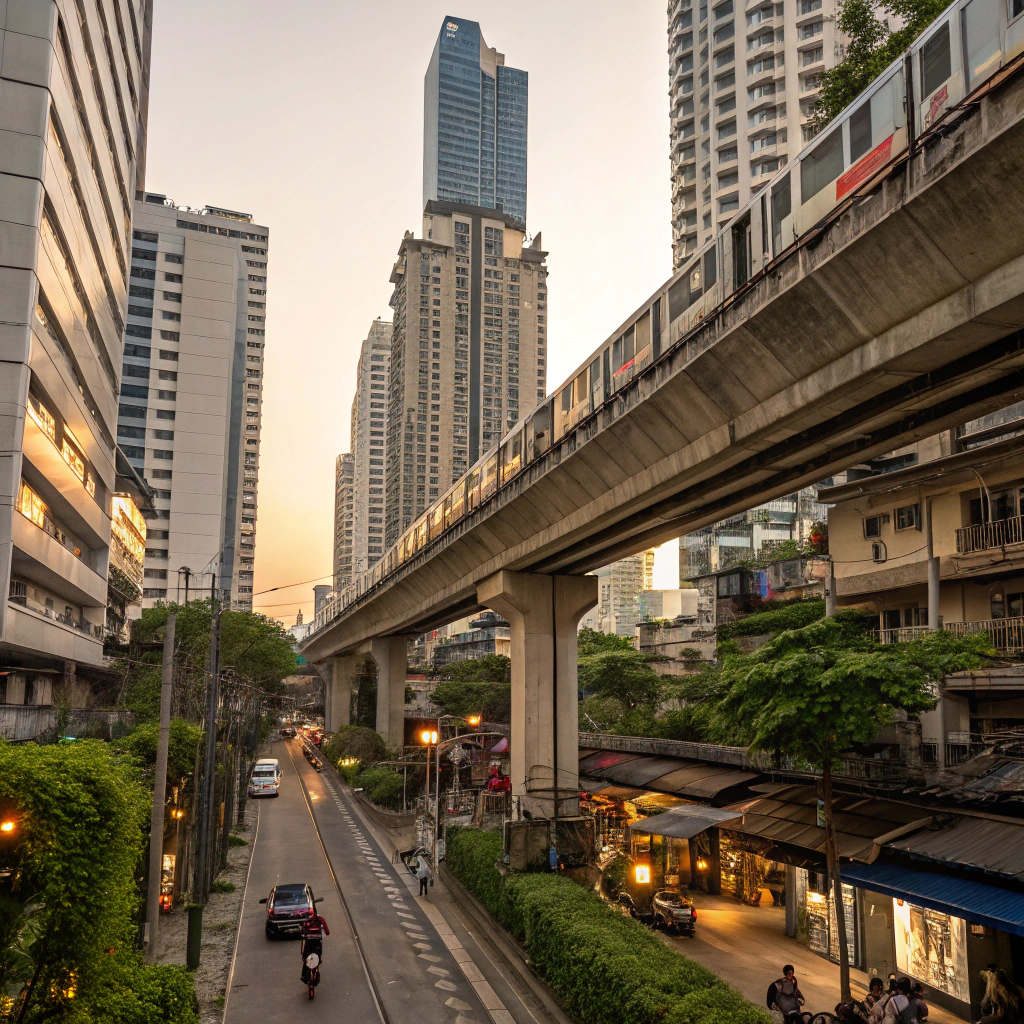
The area along Sukhumvit Road—particularly between Asok (BTS Sukhumvit Line) and Ekkamai—is Bangkok’s premier expat zone. It’s convenient, concentrated with international restaurants and shops, and extremely well-connected by public transportation.
Sub-areas worth considering:
Thong Lo (Sukhumvit Soi 55): The trendy, upscale area with boutique cafés, Japanese restaurants, and some of the city’s best nightlife. Expect to pay premium prices for the coolest address in town.
Ekkamai (Sukhumvit Soi 63): My personal favorite! Slightly more relaxed than Thong Lo but still hip, with more Thai character. Great coffee shops and an easy commute to central Bangkok.
Asok/Nana: Super convenient with both BTS and MRT stations, but parts (especially lower Nana) can be seedy due to the adult entertainment scene.
On Nut: Further down Sukhumvit but much more affordable. Popular with teachers and digital nomads on a budget. The BTS makes commuting relatively easy.
I spent two weeks in an Airbnb in Thong Lo before realizing I couldn’t afford to live there long-term without selling a kidney. Ekkamai offered a similar vibe at about 70% of the price.
Silom/Sathorn: Business District with a Side of Nightlife
Bangkok’s financial district offers high-rise living with easy access to offices, parks, and nightlife:
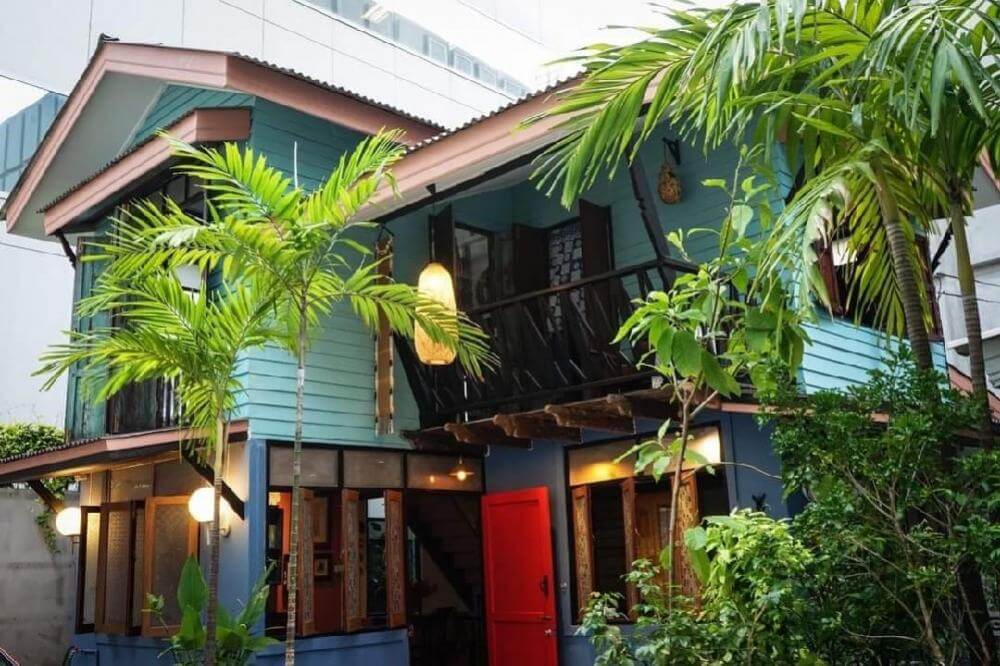
Silom: Bustling business district by day, vibrant entertainment area by night. Great street food and the famous Patpong Night Market.
Sathorn: More upscale and quieter than Silom, with embassies and luxury condos. Excellent dining options and close to Lumpini Park.
I’ve had friends who swore by living in Sathorn for its central location and slightly more “grown-up” feel compared to Sukhumvit.
Ari: The Hipster Enclave
Before Ekkamai was cool, there was Ari. This neighborhood north of downtown has become a hotspot for creative types, with indie cafés, galleries, and a distinctly less touristy vibe. Rental prices are reasonable, and the area has a more authentically Thai feel while still being comfortable for foreigners.
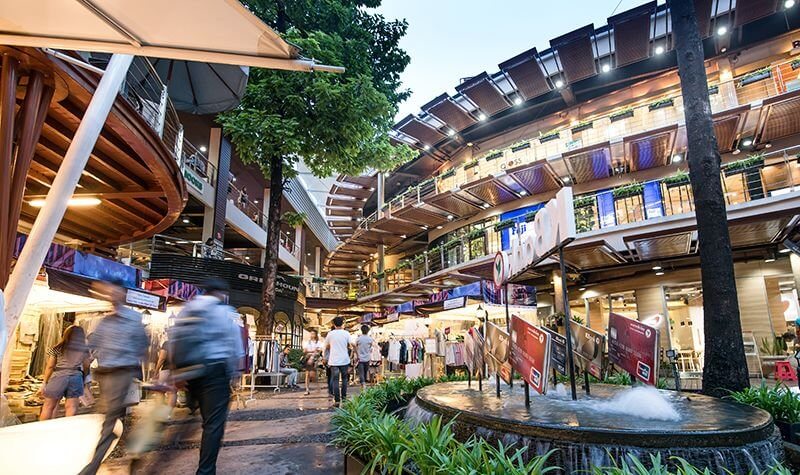
I spent a delightful afternoon in Ari and nearly changed my rental search to focus there. The only reason I didn’t was the slightly longer commute to my usual workspaces.
Budget-Friendly Areas
If your priority is stretching your baht:
Bang Sue/Tao Poon: With the new MRT interchange, these areas are increasingly convenient while remaining affordable.
Ladprao: A primarily Thai neighborhood with good transportation links and much lower rental costs than Sukhumvit.
Ratchada: Becoming trendier but still offers good value, especially in older buildings.
A digital nomad friend snagged a massive two-bedroom in Ladprao for what I was paying for my one-bedroom in Ekkamai. The trade-off? A 20-minute commute to the popular expat hangouts.
The Rental Process: What to Expect
Renting an apartment in Bangkok is surprisingly straightforward in many ways, but it does have its quirks. Here’s what the process typically looks like:
Finding Properties
There are several ways to find bangkok apartments for rent:
Online Platforms: Websites like DDproperty, Hipflat, and Facebook groups like “Bangkok Expats” or “Bangkok Real Estate” list hundreds of available properties.
Real Estate Agents: Many work specifically with foreigners and can be invaluable if you’re new to the city. They’ll arrange viewings and help negotiate. Best part? The landlord pays their commission, so it’s typically free for renters.
Walking Around: In many neighborhoods, buildings have rental offices or signs advertising vacancies. This old-school approach can sometimes uncover gems not listed online.
I tried all three approaches and ultimately found my place through a listing on a Facebook group. The agent I contacted showed me the unit the same day, and I signed the contract two days later.
Typical Requirements
To rent in Bangkok, you’ll generally need:
- Passport and visa (tourist visa is fine for many landlords, but some prefer work permits or longer-term visas)
- Deposit (typically two months’ rent)
- Advance rent payment (often one month)
- Proof of income (sometimes, especially for luxury properties)
When I was apartment hunting, several landlords were hesitant about my tourist visa until I offered to pay three months upfront instead of one. Money talks!
Negotiation Tips
Unlike some Asian cities, negotiation is absolutely expected in Bangkok’s rental market. Some tips that worked for me:
- Ask for a discount on longer-term leases (6-12 months)
- Request free internet or utilities if a rental price reduction isn’t possible
- Negotiate on furnishings (I got my landlord to add a desk and office chair since I mentioned I’d be working from home)
- Be prepared to walk away—there are TONS of options in Bangkok
The asking price for my Ekkamai apartment was ฿30,000, but I negotiated it down to ฿28,000 by agreeing to a six-month contract instead of three months.
One negotiation that failed spectacularly: I tried to get my landlord to install a washing machine on the balcony. He looked at me like I had suggested installing a water buffalo in the bathroom. Some battles aren’t worth fighting.
Understanding Thai Lease Agreements
Thai rental contracts can vary wildly in terms of detail and provisions. Here’s what to look for:
Common Contract Terms
Most leases include:
- Rental period and conditions for renewal
- Payment terms including due dates and late fees
- Utility payment responsibilities (typically tenants pay for electricity, water, and sometimes internet)
- Rules regarding property modifications (usually very limited without permission)
- Conditions for return of deposit
My contract was surprisingly straightforward—just two pages in both Thai and English. The most important clause covered the deposit return, which specified “normal wear and tear” wouldn’t count against me.
Potential Red Flags
Watch out for these concerning contract elements:
- Excessive cleaning or maintenance fees upon move-out
- Unreasonable restrictions on guests or activities
- Clauses allowing the landlord to enter without notice
- Extremely high electricity rates (some buildings mark up government rates significantly)
- No clear provisions for breaking the lease early
I nearly signed a lease that would have charged me ฿7/kilowatt hour for electricity when the government rate was around ฿4. That would have added hundreds of dollars to my monthly expenses!
Deposits and Fees
Standard deposit practice is two months’ rent, refundable after you move out (assuming no damages). Some buildings also charge:
- Key money (an additional non-refundable fee, though this is becoming less common)
- Cleaning fee (either upfront or deducted from your deposit)
- Utility deposits (separate from rent deposit)
- Registration fee (for building ID cards, etc.)
I was initially surprised by being asked for three months’ worth of money upfront (first month + two months’ deposit), but this is standard practice throughout Thailand.
Daily Living in Bangkok Apartments
Once you’ve secured your perfect pad, what’s it actually like living there?
Dealing with Utilities and Services
Most bangkok apartments for rent require tenants to handle:
Electricity: Usually billed monthly, either by the building or directly through the Metropolitan Electricity Authority (MEA). Rates in newer condos are typically ฿7-8/unit.
Water: Typically very inexpensive (a few hundred baht monthly) and sometimes included in the rent.
Internet: Some buildings have contracts with specific providers, while others allow you to choose. Expect to pay ฿600-1,000 for decent fiber service.
Pro tip: Air conditioning is BY FAR your biggest utility expense in Bangkok. Setting your thermostat even 2 degrees higher can cut your electricity bill dramatically. I learned this after my first shocking ฿4,500 power bill!
Maintenance and Repairs
The approach to maintenance varies widely:
Condos: Usually have maintenance staff who can handle basic issues, often at no cost for simple fixes.
Apartments and Houses: Typically rely on the landlord to arrange repairs, which can sometimes take longer.
My experience was mostly positive. When my air conditioner started leaking, the building’s maintenance guy fixed it within hours. When I needed a new refrigerator (the old one died dramatically in the middle of the night), it took three days and several reminder calls to get it replaced.
Security Considerations
Security in Bangkok apartments is generally excellent, particularly in condos and serviced apartments, which typically feature:
- 24-hour security guards
- Key card access
- CCTV in common areas
- Secure parking
Even in budget buildings, there’s usually at least a guard or keyed entrance. Street crime in Bangkok is remarkably low compared to many world cities, but standard precautions still apply.
The security at my Ekkamai condo was almost comically thorough—they once held up a food delivery for five minutes while calling to confirm I had actually ordered it.
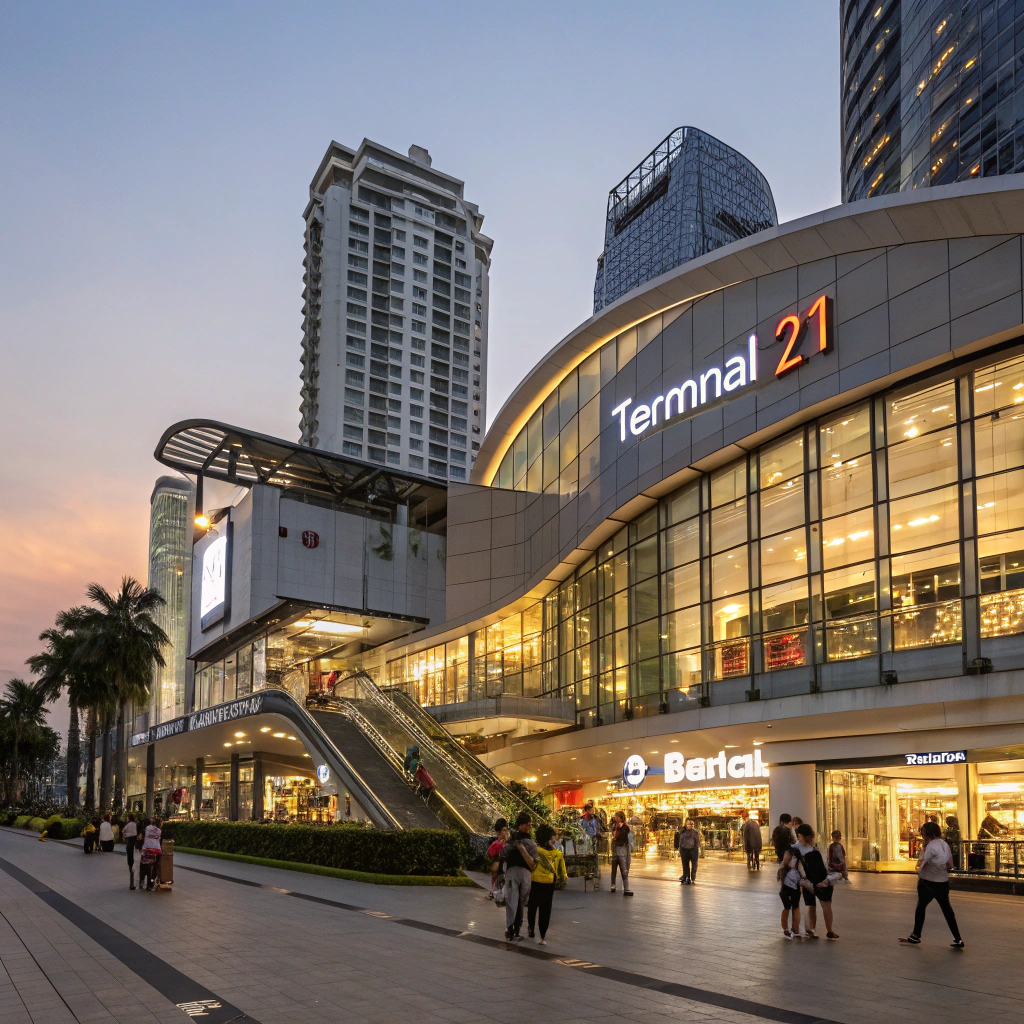
Furnishings and Setup
Most bangkok apartments for rent come furnished, but the quality and completeness vary enormously.
What’s Usually Included
Standard furnished apartments typically provide:
- Bed and mattress
- Basic living room furniture (sofa, coffee table)
- Dining table and chairs
- Refrigerator and microwave
- Air conditioning units
Higher-end places might also include washing machines, dishwashers, and fully equipped kitchens.
What You’ll Need to Buy
Common items tenants need to purchase:
- Kitchenware (pots, pans, dishes)
- Linens and towels
- Small appliances (kettle, toaster)
- Cleaning supplies
- Decorative items to make it feel like home
Here’s a little hack I discovered: Check out the home section at Terminal 21 mall for affordable but decent quality homewares. Way better than the tourist markups at places like Central World.
Setting Up Utilities and Internet
For new rentals, you’ll typically need to:
- Transfer electricity and water accounts into your name (the building management or landlord usually helps with this)
- Arrange internet installation (can take 1-7 days depending on the provider and building)
- Set up bill payment (many expats use automatic bank transfers or mobile payment apps)
Getting my internet set up was the biggest headache of my entire rental experience. The technician missed two appointments before finally showing up unannounced on a Sunday morning when I was still in my pajamas. Maybe schedule yours before you move in if possible!
Neighborhood Living: Making the Most of Your Location
One of the joys of renting in Bangkok is experiencing your own little pocket of this diverse city. Each neighborhood has its own character and hidden gems.
Finding Local Amenities
Every Bangkok neighborhood has its essentials, but they’re not always obvious to newcomers:
Street Food: Often the best food is from unmarked stalls or simple shophouses. Follow the locals during lunch hour.
Markets: Fresh markets (talad sot) are ideal for produce and meats, while night markets offer clothing and household items.
Convenience Stores: Family Mart and 7-Eleven are EVERYWHERE and surprisingly useful for daily needs.
Laundry Services: If your apartment doesn’t have a washer, look for coin-operated machines or drop-off services (typically ฿40-60 per kg).
In Ekkamai, I discovered a tiny alley behind my building that contained a superb som tam (papaya salad) vendor, a laundry service, and a woman who sold homemade Thai desserts from a card table. None of them appeared on Google Maps, but they became essential parts of my daily life.
Transportation Options
Getting around from your apartment is crucial to quality of life in Bangkok:
BTS Skytrain and MRT Subway: The gold standard for commuting. Apartments within 500m of a station command premium prices for good reason.
Buses: Extensive but confusing network that’s incredibly cheap (฿8-20 per ride).
Motorcycle Taxis: Those orange-vested drivers can zip you through traffic for short distances. Negotiate the fare before riding.
Grab/Bolt: Thailand’s ride-hailing apps work well but can be expensive during rush hour or rain.
I initially thought I’d take the BTS everywhere, but ended up becoming best friends with the motorcycle taxi guys at the end of my soi. They recognized me after the first week and would often give me the local price without negotiation.
Cultural Considerations for Apartment Living
Living in Thailand comes with its own set of cultural norms that affect apartment life:
Being a Good Neighbor, Thai Style
Some cultural points to be aware of:
Noise sensitivity: Thais are generally tolerant of ambient noise but direct, personal noise (like loud music from your apartment) is frowned upon.
Removing shoes: Always remove shoes before entering someone’s home, and many Thais do this for their own apartments too.
Respectful communication: Even when problems arise, maintaining a calm, smiling demeanor will get you much further than visible frustration.
I learned this lesson the hard way after a heated exchange with a neighbor about their 5am furniture moving. My direct American approach backfired spectacularly. When I later apologized and approached the issue more gently (with help from a Thai friend), it was resolved immediately.
Dealing with Language Barriers
In many buildings, especially those not catering specifically to foreigners, staff may speak limited English:
Translation apps like Google Translate can be lifesavers, especially the camera function for reading Thai documents.
Learning basic Thai phrases related to your apartment (broken, hot, cold, leak) is incredibly useful.
Pictures and gestures go a long way when words fail.
The maintenance staff at my building spoke almost no English, but we developed an effective communication system combining my terrible Thai, hand gestures, and Line messenger stickers. Somehow, it worked!
Common Challenges and How to Overcome Them
Even the best bangkok apartments for rent come with occasional headaches:
Pest Control
The tropical climate means bugs are a reality, but you can minimize them:
- Regular cleaning, especially of food areas
- Prompt garbage disposal
- Keeping dry foods in sealed containers
- Using door sweeps and window screens
I waged a month-long war against tiny ants in my kitchen before discovering they were entering through a nearly invisible crack beside my sink. A little silicone sealant solved the problem permanently.
Weather Considerations
Bangkok’s climate affects apartment living in several ways:
- Mold and mildew can develop quickly in bathrooms and closets
- Air conditioning costs soar during the hottest months (March-May)
- Flooding can be an issue during rainy season in some areas
After returning from a two-week trip, I found mold had colonized my entire closet. Now I always leave a dehumidifier running when I travel.
Landlord Relationships
Maintaining a good relationship with your landlord or building management makes everything easier:
- Pay rent on time
- Report issues promptly but politely
- Respect building rules
- Consider occasional small gifts for staff who help you regularly (not required but appreciated)
The security guards at my building became my unofficial mail receivers, package holders, and even grocery accepters when I wasn’t home. A box of snacks or drinks for their break room every few months was a small price for their invaluable help.
Conclusion: Finding Your Perfect Bangkok Home
After six months in my Bangkok apartment, I extended my lease for another six months—the ultimate testament to finding a good match. The city has a remarkable way of becoming home, even for perpetual wanderers like me.
The key to successful bangkok apartments for rent hunting is balancing your budget, location needs, and lifestyle priorities. Don’t rush the process—what seems like a minor inconvenience during a viewing (like that tiny kitchen or slightly longer walk to the BTS) might become a daily frustration once you’re living there.
Take your time, see multiple options, and trust your instincts. Bangkok’s rental market moves quickly but not instantaneously—there will always be another great apartment if the first one doesn’t work out.
Remember that your bangkok apartment isn’t just a place to sleep—it’s your base for exploring one of Southeast Asia’s most exciting cities. Choose a location that energizes you, a space that comforts you, and a setup that allows you to fully embrace the magnificent chaos that is Bangkok.
And when the inevitable hiccups occur (they will!), approach them with the same flexibility and sense of humor that makes traveling in Thailand so rewarding. Nothing here ever goes exactly as planned, but it usually works out even better than you expected.
Have you rented an apartment in Bangkok? Planning to? I’d love to hear about your experiences or answer questions in the comments below!
FAQs About Bangkok Apartments for Rent
Q: Can foreigners legally rent apartments in Bangkok?
A: Absolutely! While foreigners cannot own land in Thailand, renting is completely legal and straightforward. No special permits are required beyond your normal tourist visa or other visa status.
Q: What’s the minimum rental period for apartments in Bangkok?
A: While some landlords prefer 6-12 month contracts, plenty of options exist for 3-month rentals, especially in areas popular with expats. For stays under 3 months, serviced apartments or Airbnb might be more appropriate (though more expensive).
Q: How much should I budget for utilities in Bangkok?
A: For a one-bedroom apartment with regular air conditioning use, expect to pay ฿2,000-4,000 for electricity, ฿100-300 for water, and ฿600-1,000 for internet monthly. Using air conditioning conservatively can dramatically reduce these costs.
Q: Is it better to rent directly from owners or through agencies?
A: Both have advantages. Agencies offer more options and English-speaking service but might focus on higher-priced units. Direct-from-owner rentals can sometimes be cheaper, but the service level varies enormously based on the individual landlord.
Q: What areas should I avoid when renting in Bangkok?
A: Rather than specific “bad” neighborhoods, consider practical factors like flood-prone areas during rainy season, locations far from public transportation, or areas with heavy traffic congestion. Your ideal location depends largely on where you need to be regularly for work or other activities.
Q: What’s the deal with electricity rates in Bangkok apartments?
A: This is important! Government electricity rates are around ฿4-5 per unit, but many condos charge ฿7-8 per unit. This markup is technically legal and standard practice, but it significantly impacts your monthly expenses. Always ask about the exact rate before signing a lease.
Q: Can I negotiate rent prices in Bangkok?
A: Yes, and you should! Most asking prices have room for negotiation, especially for longer lease terms. A 5-10% reduction is often possible, particularly if you’re willing to commit to a longer rental period or if the unit has been vacant for a while.
